#vascular compressions
Explore tagged Tumblr posts
Text
Well, it’s finally happening. My parents are withdrawing a portion of my monthly financial support. My husband has been out of work since early October and he finally found a job, but isn’t able to start until January.
We desperately need help to be able to make rent, pay utilities, and get food on the table on top of other monthly bills that can not go unpaid. I have spent the past 2 years begging my parents for the help they explicitly promised me when they found out my FIL gave me COVID in January 2022. I never recovered and still have a whole host of other complex health conditions that was significantly exacerbated. I still don’t have a definitive answer whether or not Long COVID is part of it because it reactivated a latent Bartonella infection that I got who knows how long ago. Not to mention the connective tissue disorder, dysautonomia, MCAS, chiari, and tethered cord I was already dealing with pre-infection, just undiagnosed and not taken seriously. My parents offered to help me financially because I had to stop working. I went back to work after my infection cleared, even though I know I wasn’t fully recovered, and relapsed very hard in May of 2022. That was when the full financial assistance from my parents really began, and they continued to try to convince me they would never turn down helping me.
For the next 6 months my mother berated me and made it known that she resents me because she wasn’t able to get “her pool” installed in the summer of 2022 because she had to help me, her eldest daughter. At one point she made me choose between my health and wellbeing or my sister’s (she is also disabled, but lives at home, and receives SSDI, which I do not qualify for). She ate her words that time. But they’ve been trying to get out of helping me ever since they offered. And now, my parents have taken it upon themselves to lower my financial assistance after my husband lost his job, and without even consulting me. They texted my husband, never made contact with me, and when I called them out on it made excuses that I don’t talk to them often enough. (Huh, imagine that. I don’t really want to contact my abusive parents, but it sure does highlight some of the abuse that’s gone on my entire life). I am not in a position to be able to turn down what they are giving me, though I can not wait until the day I can officially become no contact.
I need help. I’m exhausted from trying to fight for assistance I was promised by my own parents in addition to the extreme exhaustion that comes with living with complex chronic illness. I don’t know what to do at this point. I’m going to leave my Venmo link in hopes that maybe some of you are in a position that allows you to give assistance. If you are not able to, please share this. I don’t have a platform on any of my socials and really do not feel comfortable sharing it on Facebook where I have family members who also choose to ignore pleas for help.
#crowdfunding#crowdfunding request#mutual aid#mutual aid request#disabled#disability#COVID#long COVID#bartonella#MCAS#dysautonomia#tethered cord#chiari#ehlers danlos syndrome#vascular compressions#gastroparesis#olive blogs#cw abuse mention#osddid#dissociative disorder#neisvoid#please help me
2 notes
·
View notes
Video
(Vascular Compression Syndrome Introduction on Vimeo)
An *outstanding* explainer video about vascular compression syndromes incl. MALS, SMAS, May Thurner, Thoracic Outlet Syndrome and more.
#vimeo#compression syndrome#vascular health#chronic illness#May Thurner Syndrome#MALS#SMAS#Thoracic Outlet Syndrome
2 notes
·
View notes
Text
I was right. On my ultrasound they found out that my superior mesenteric artery is tortuous (twisted) and narrowed, and my celiac artery is also narrowed. This is causing lack of blood flow to my organs and all of the symptoms I’ve been having for three years.
It took one doctor to believe me, and then one test to confirm. I want to feel happy but I can’t, not fully, because I knew it would take so little to confirm or deny my suspicions— yet all the doctors previously didn’t believe me, and the last GI doctor laughed at me and said “[a vascular compression syndrome] is a zebra in a field of horses”.
I was right, and it almost fucking killed me to get this test because of all the other useless doctors who couldn’t set aside their egos.
#personal#chronic pain#no longer undiagnosed#chronic illness#disabled#cripple punk#ehlers danlos syndrome#chronically ill#important#war is not over
62 notes
·
View notes
Text
Happy New Year!
Let's imagine it was the Earth itself that was going into its 2024th year. That is to say, we're compressing the entire history of the Earth into just the past 2023 years. What events would have happened when?
Well, not too much is certain about the first couple decades after our planet formed, until around 50 CE when we were hit by another proto-planet, Theia, and the debris formed the Moon. After a couple years of the planet cooling down again, the oceans formed out of boiling rain. The timing of the origin of life is very uncertain, but there are chemical signs it may very well have happened as early as the second century. Around 200 CE, the gas giants did a big funky orbit-swapping dance, and in the process inflicted the Late Heavy Bombardment on the rest of the solar system, meaning the Earth was suffering a ton of meteorite strikes for the entire third century.
The first indisputable evidence of life is from around 330, and the first stromatolites appear around 470. Those are basically the first fossils, stones created by layer upon layer of oxygen-producing cyanobacteria living and dying on top of one another. But even with oxygen producers evolving, it would take many centuries before oxygen became a major part of the atmosphere: not until the Great Oxygenation Event, which happened during the ninth and tenth centuries. That's also about the time the first complex, eukaryotic cells evolved through a symbiosis between an anaerobic archaean and an oxygen-breathing bacterium. The bacterium became more and more focused on just the oxygen-breathing task inside the larger cell, until its descendants were mitochondria, which as you all know are the powerhouse of the cell. The next seven centuries passed by with only slow, gradual changes, and life continuing to be unicellular and difficult to find in the fossil record.
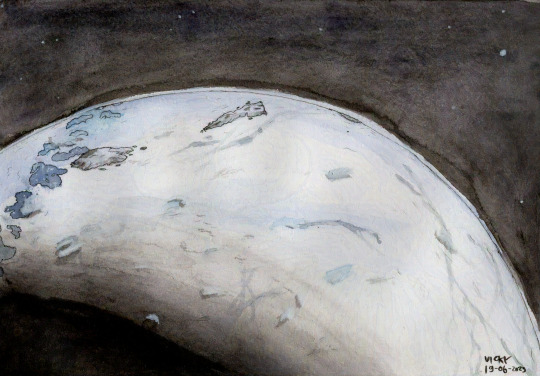
(1735's Snowball Earth, by me)
From 1704 to 1730, the entire planet froze over. After merely two years of thaw, it happened again, this time lasting from 1732 to 1742. But these snowball Earth episodes set the stage for the evolution of animals that began right after. Across the mid-18th century, the bizarre Ediacaran biota, with its strange symmetries, fronds, and fractal-like pattern filled the oceans. In the early 1780s they went extinct, possibly due to a temporary drop in oxygen-levels, only to be replaced by a great variety of quite different creatures in the Cambrian Explosion.
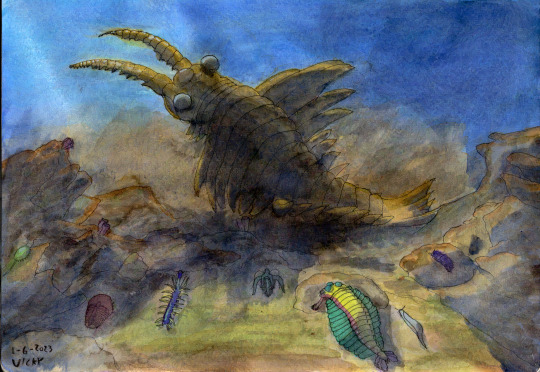
(Class of 1799, by me)
Starting in 1784 and running for a few decades, the Cambrian period saw the origin of most of the modern animal phyla, reaching its most famous form in the Burgess Shale fauna of 1799. During this time, most animals still lived on the sea floor, either attached or crawling, with relatively few actually swimming creatures. Plants started tentatively moving onto land around 1817, and in 1825, the rising of the great Appalachian mountains caused a severe drop in global CO2 and thus temperatures, leading to the Late Ordovician mass extinction.
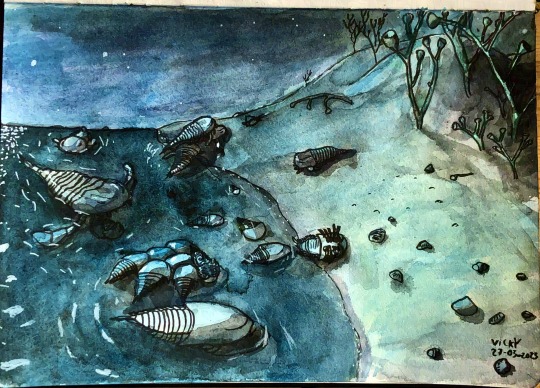
(Horseshoe crabs and sea scorpions on a beach in 1834, by me)
Bony fish first showed up during the 1830s, and around the same time plants were getting serious about inhabiting the land, evolving roots and vascular tissues so they could properly grow there. Millipedes and the ancestors of spiders were the first animals to follow them onto land. Our own fishy ancestors did not take their first step until 1857, by which point the arthropods were well established there and the plants had figured out how to become trees. The Late Devonian extinction, partially caused by the evolution of said trees and partially by the south pole freezing, played out in two pulses over the late 1850s and early 1860s.
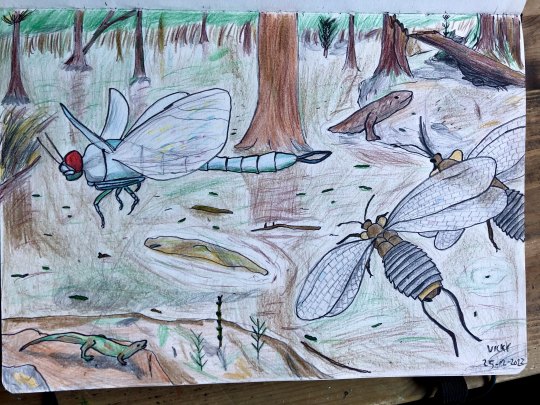
(Swamp prominently featuring Meganeura and Mazothairos in 1889, by me)
Arthropods and vertebrates continued to gain adaptations to life on land. The insects became the first creatures ever to fly in 1878, and the high-oxygen atmosphere of the time would be especially good to them. Around 1884, a group of vertebrates called the amniotes, after the membrane that kept water inside their eggs so they could lay them on land without them drying out, split into two groups: the reptiles and the synapsids (which we mammals descend from). The next few decades would see the synapsids in particular being extremely successful as the supercontinent Pangaea formed. Until 1912, when a massive episode of volcanism caused the worst mass extinction of all time, the Great Dying, scouring the Earth of a huge portion of its life.
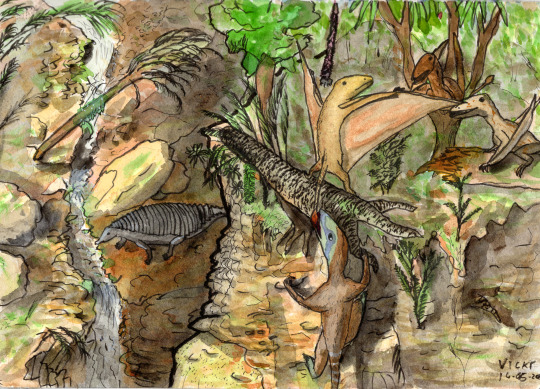
(A 1930 scene featuring the three branches of archosaur: dinosaur, pterosaur, and pseudosuchian, by me)
The 1910s were a period of slow recovery during which strange new forms of animal evolved. Many different, unrelated reptiles, such as the ichtyosaurs and plesiosaurs, went to sea, where they would continue to provide some of the most impressive creatures for most of the 20th century. On land, the dinosaurs first appeared in 1920, though for the next decade or so they'd live in the shadow of their pseudosuchian (crocodile-line) cousins. In 1934, Pangaea began to break up, resulting in another terrible pulse of volcanism that caused a lot of extinctions and left particularly the feathered and furry survivors with a lot of empty niches to fill, allowing the dinosaurs and mammals to diversify greatly. The last common ancestor of all modern mammals lived in the early 1940s, and by 1957 the dinosaurs had figured out flight, with Archaeopteryx usually being considered the first bird. Other dinosaurs took on an incredible variety of sizes, shapes, and forms. Some of the most famous ones include Dilophosaurus (1942), Diplodocus and Stegosaurus (1955), Iguanodon (1969), Velociraptor (1991), and Tyrannosaurus rex (1994).
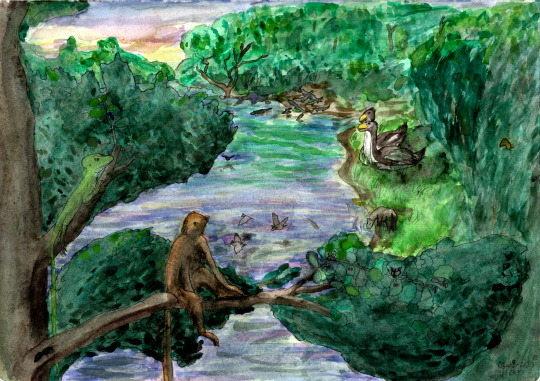
(A tropical lakeside in the year 2000, by me)
In 1995, the world was struck by a meteorite, wiping out many groups, including the marine reptiles, pterosaurs, and ammonites. The surviving mammals and dinosaurs went on to diversify across the next couple of years and had formed thriving new ecosystems in the tropical world of the turn of the millennium. The first known bat lived in 2001, and the whales returned to the oceans next year. Around 2009, the world's climates turned colder and dryer. Antarctica froze over and grasslands spread widely. Our last common ancestor with the chimpanzees and bonobos lived in 2021, and by new year 2023, our ancestors were getting brainier and more proficient with tools. That's also when the north pole froze and the Quaternary ice age cycle began. The first known members of Homo sapiens lived on 10 November 2023. The latest ice age started on 14 December, and ended at 2 AM on 30 December. The great pyramid of Giza was built at 6 AM on 31 December and On The Origin Of Species was published at 23:22 PM.
#palaeoblr#happy new year#2024#geologic timescale#vicky's vritings#one year is 2.244 million years if you're curious#and yes i did exclude both year 0 and 2024#since 0 doesn't exist and 2024 hasn't happened yet#my art#i rather enjoy having an extensive collection of my art to illustrate my paleorambles nowadays#incidentally the big bang occurred in 4121 bce at this scale#which is curiously close to the date of creation creationists made up#if only they would follow through and insist humanity itself was seven weeks old too
125 notes
·
View notes
Text
Home Nursing Advice Column #2: Tracking and Treating Small Skin Infections
Small skin infections occur when bacteria enter the body through a cut or nick in the skin. As the bacteria multiply, the body's immune system responds, causing the area to become hot, swollen, red and painful. This response encourages blood flow through the area, bringing bacteria-fighting white blood cells and carrying away dead bacteria and other waste.
You can tell whether you need to see a doctor about this infection by tracking how quickly it spreads through the skin. Do this by drawing an outline around the reddened area. The line should be tight against the edge of the infection so you can see if the infection gets bigger or changes shape.
If the redness spreads rapidly (if you can see a significant difference within about an hour), call a doctor, as this might require antibiotics to treat. Other reasons you might want to see a doctor is if there is a pocket of pus below the site of infection, you have diabetes or vascular problems, or if the area is more than 2 inches across.
If the infection is spreading very slowly or while waiting for a doctor to call you back, you can help the process along and speed up healing by using hot, moist compresses.
Take 2-3 cotton washcloths or rags and put them in a pan of tap water. Heat the water on a stovetop to about 107-110 degrees F. Take the first cloth out, wring the excess water out of it, fold it, and press it against the site of infection. It should be uncomfortably hot, maybe somewhat painful, but it should not burn you.
Every minute or so, put the first cloth back in the water, and take the next cloth out, wring it out, fold it, and place on the infection. Repeat for 20-30 minutes, then allow the site to go back to it's normal temperature.
Do this every 2-3 hours while awake. Right before each session, draw your outline of the reddened area the same way you did initially. You should start to see the red area shrink. If you don't see any change within a day, call a doctor.
101 notes
·
View notes
Text
What's going on with Nemona's wrist?
this is mostly just me putting down all my thoughts about this hc I have. Below the cut bc it's long as usual but read on if ur interested in like. orthopedics
I think Nemona has fatigue and some kind of wrist Issue because 1. She implies she has decreased motor function in that arm (can't throw pokeballs well, supports her arm with her other hand during battles) 2. She wears a brace 3. She gets winded easily / needs to catch her breath more than other characters / hates stairs So that got me wondering what the cause could be. I work in an orthopedic office and my shifts are 12 hours so sometimes when it's slow and I'm bored this is what my mind wanders to
Option 1: It's carpal tunnel and she's out of shape This is the most obvious answer since carpal tunnel is a repetitive stress injury and she's wearing a brace that looks almost identical to irl braces for that problem. Throwing pokeballs over and over, especially incorrectly, would be the most likely cause of an asymmetrical injury like that, and is actually reasonable for someone of her age and activity level. The winded thing is just because she's out of shape and has no underlying cause. Or maybe she just has some kinda chronic pain / fatigue disorder. That's not my department idk
Option 2: Oligoarticular JIA (juvenile idiopathic arthritis) This very long name is just describing chronic joint swelling in children that affects less than 5 joints. It's an autoimmune disease, and actually not that uncommon all things considered. It causes stiffness and pain, which would explain the stamina issues and motor skill issues. Plus, the constant flexion and extension of the knees from staircases certainly would explain her distaste for them in particular. That shit hurts. Occasionally people will use a brace for JIA-- it's highly unlikely her wrist would be the worst considering the typical presentation patterns (it usually affects bigger joints first like the knees) but hey. It's possible! This condition also affects young girls more often than other groups so. Math checks out
Option 3: Ehlers-Danlos Syndrome (hypermobility type) Figured I would include this bc I've seen a few people hc this and wanted to give it a fair shot myself. This is a heritable connective tissue disorder that causes hypermobile joints, chronic pain, fatigue, and a whole host of other things. Specifically tho, this disorder used to be called EDS type III and is now considered part of the Hypermobility Spectrum Disorders, but that's a can of worms for a post that's not this one. While the symptoms do match, and honestly quite well (a brace for stabilization makes perfect sense and the fatigue symptoms feel pretty on the nose) the disease usually causes very stretchy skin and vascular issues that she doesn't seem to have so I'm a tad on the fence
Option 4: Cervical spinal stenosis Despite this being the first thing that came to mind for me (since I see it a lot in the office) I'm now less convinced this would be the case. This disorder is basically a narrowing of the spinal canal that pinches the nerves in the neck. It can cause pain, weakness, numbing, and pain that radiates down the body. If most of the compression was on the C4 and C5 nerve I can see it affecting one arm / wrist especially rough (since the pain is typically bilateral but asymmetrical) but also this occurring in people under the age of 50 is SUPER rare so eh. It's possible it was congenital or caused by an injury but I wouldn't bet on it. As for the stamina issues, the neurological issues caused by the compression would likely be the cause of that, especially radiating down the back and legs. Felt worth it to include even if I'm not 100% convinced
I'm saying "options" here bc these symptoms are super vague and there's like 80 billion things that could cause it, I'm just racking my brain for different possibilities. If anyone has other hcs for the underlying causes of Her Whole Deal lmk I'm curious
#i know this is completely deranged but it's pride month let me have this#nemona#pokemon sv#headcanons#mod vex
166 notes
·
View notes
Text
[malnutrition, food, medical diet, weight discussion]
My entire body hurts so bad today and I am so exhausted despite having like 10 hours of sleep. My body and nervous system are so overwhelmed from malnutrition on top of my usual complex chronic illness stuff and it is seriously difficult to come out of it. The intense fight or flight response that I’ve been in for months feels never ending and nothing has really been able to calm me down. I was always aware of physical effects of malnutrition, but my level or anxiety is higher than I’ve ever experienced and my dissociation threshold feels nonexistent. And the worst part is knowing that food will help, but if I overdo it I’ll end up in the hospital again with significantly worse symptoms.
I’ve unintentionally lost so much weight over the past few months because I haven’t been able to eat normally and I don’t tolerate my Soylent meal replacement shakes anymore. It’s quite scary watching my body change like it is and that definitely confounds my anxiety. I’m really glad my pcp was able to get me a prescription for a meal replacement shake because I really don’t want a feeding tube and am doing everything that I can to avoid one. I just really miss food and making meals, which is making my medical diet more difficult. (It helps knowing I absolutely can not tolerate the pizza I really want, but it’s just hard restricting myself so much).
And it’s so fucking difficult to actually hydrate myself and stay hydrated even *with* IV hydration. I am really so miserable and in so much pain and so nauseous.
#cw food#cw weight#cw medical diet#cw malnutrition#Olive’s medical updates#olive blogs#disability#I really just want to eat food so badly#but my gastroparesis keeps telling me no#malnutrition recovery is honestly so difficult and so slow#but I know it can’t be faster#ugh#abdominal vascular compression syndromes#SMAS#MALS#nutcracker syndrome#gastroparesis#endometriosis#and I’ve also been very heavily dissociated for months my#osddid#signed: kim & olive & ann
5 notes
·
View notes
Text
okay so i have the bit where i reblog the post about genya having MALS every time mine flares up, but i realize nobody likely knows what the hell MALS is because it’s pretty rare and massively underdiagnosed. so because this is a thing that Hurts Me A Lot, and also because i genuinely do think it makes canonical sense for genya to have it, so im gonna infodump about it! obvious tw for medical shit and mentions of vascular problems. please do note I am not a professional- just a patient with too much time and having to do my own research because doctors won’t listen to me <3 I write from my own experience and very surface-level research; this is in no way an academic paper.
okay! MALS! what is it? MALS stands for Median Arcuate Ligament Syndrome. The median arcuate ligament is a vascular ligament in the lower part of your chest, and MALS is a kind of chronic vascular compression condition where this ligament sits lower than it should. This puts pressure on the celiac artery, which supplies blood to the stomach, liver, and all the other organs and stuff in the lower abdomen.
The symptoms vary, but from the limited research out there as well as my own experience, the primary symptom of MALS is agonizing chronic stomach pain, which has a risk of flaring up after eating or exercise. In my own experience, it’s both, but it’s mostly food. I’ve had days where I barely eat, or eat much less because i really don’t want to have to deal with a flareup. There’s no foods that trigger it specifically as far as I know, but I’ve noticed that things with high fat or oil contents make the flareups happen faster. For example, sushi- I love tuna nigiri, but the fat in the raw tuna always leaves me in agony 😔 I’ve also had to leave the gym early sometimes, because exercise triggers it. This is less common in my experience, though.
The pain is normally manageable- it feels like a stabbing cramp in my lower abdomen, typically about a 4-5/10 on the pain scale. It sucks, but normally i just have to sit down for about 20 minutes and it passes. But the worst ones have had me completely immobilized, sometimes for hours at a time. The worst one I ever had actually had me hospitalized; I was on the floor curled up, in so much pain I could barely even breathe. It was like someone was twisting knives in my insides- I thought I was dying. I run the risk of pain like this every time I eat. Pain like that is rare for me, and I’ve never met anyone else with my condition, but if they feel pain like that more often than I do, it’s all the more reason to raise awareness for MALS.
As far as I know, there’s nothing to be done for pain management. Ibuprofen and things like that either don’t touch it, or the pain simply passes before it takes effect. Regardless, the only thing I’ve found to do is wait it out, and don’t strain myself. There is a surgical cure, an open vascular surgery to relieve the pressure on the artery. But MALS is very rare, mostly because it is massively, massively underdiagnosed. It took ten years for doctors to stop telling me I was just lactose intolerant/experiencing menstrual cramps and actually run a CT scan on me. I believe the diagnoses rate is two out of every hundred thousand patients. MALS is mistaken for all sorts of things; lactose intolerance, IBS, Crohn’s, pretty much any Tummyache Disorder can get confused for MALS. Additionally, I’ve found mentions of patients saying doctors just straight up don’t believe their pain because there’s no obvious cause. In my experience, finding treatment has been nothing short of a nightmare; because MALS is only debilitating and not technically dangerous, I’ve had countless doctors dismiss my case and tell me to just deal with it. (I could go on a whole rant about sure, yeah, just deal with a coin flip’s chance of agony if I want to sustain myself by literally eating, but whatever thank you fuck you every doctor.) Regardless, MALS is really underdiagnosed, and it’s fairly under-researched as well.
Anyway, onto Genya Shinazugawa. From a surface level, I headcanon him to have MALS because he’s my blorbo and I love projecting onto fictional characters, but if I do a bit of analysis it actually makes a lot of sense. The most obvious symptom is his demon-eating; his ‘stronger’ digestive organs could be some fictional result of MALS. Something or other less blood flow tolerates demon magic something something fantasy. The important thing is, it’s mentioned in the manga that Genya has frequent checkups at the Butterfly Mansion due to his demon eating. I can’t remember exactly where, but im pretty sure it’s mentioned that this ability is harmful to his health/causes him pain. Therefore it’s not unreasonable to assume that eating demons can trigger Genya’s MALS, just as tuna triggers mine. Additionally, it was mentioned in the anime (I believe it was a Taisho Era Secret in the Swordsmith Village arc?) that Genya often refuses food, going long periods without eating. This is a common mental side effect of MALS- a lot of patients, myself included, develop a hesitance or even fear of eating due to the likelihood of it triggering a flareup. It’s likely that Genya is doing the same thing.
Anyway!! If you have any questions, or feel that I’ve missed something, please let me know!! As per usual for me I’ve written this mostly past 3am, so it’s possible I could have my lore crossed!! Regardless id be interested to hear everyone’s thoughts on this headcanon, because it’s not one that I’ve heard before. Thanks for reading! 💜🪲
#leon rambles#kny analysis#genya shinazugawa#demon slayer#kny#chronic illness#MALS awareness#median arcuate ligament syndrome#chronic illness awareness#tw medical
25 notes
·
View notes
Note
with their superior vascular system, can gallifreyans still get pins and needles from reduced blood flow, like humans do?
Can Gallifreyans get pins and needles?
Paraesthesia, or pins and needles, occurs when pressure is applied to a nerve, usually due to restricted blood flow. It's the sensation that kicks in when a nerve - having been compressed - suddenly 'wakes up' as blood flow is restored. It's like your friend dozing off at a party (the numbness) and then protesting when you try and stuff them in a taxi (the paraesthesia).
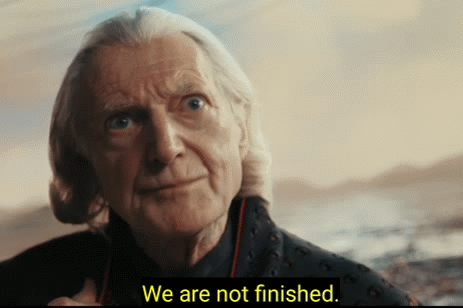
👽The Nerve of It All
Gallifreyans, on the other hand, boast a vascular system that makes human arteries look like amateur hour. They have blood pressure levels sitting around 180/120 on average, and can also control their blood vessel dilation like tuning a guitar. However, this doesn't give them immunity from pins and needles.
In humans, paraesthesia is often a result of pressure on peripheral nerves, and for Gallifreyans, the story isn't all that different. Nerve compression followed by reperfusion leads to a burst of nerve signals as the nerve 'wakes up'. Even with their superior blood flow, a Gallifreyan nerve under pressure can behave similarly. The difference lies in the causes.
🌟Varied Causes in Gallifreyan Biology
Significant Physical Pressure: Just like humans, if they sit weirdly for too long they're going to feel it.
Self-Induced Temporary Ischemia: As part of their unique healing processes, Gallifreyans might deliberately restrict blood supply (ischemia), leading to paraesthesia during scenarios such as post-regeneration periods or during a healing coma.
Insufficient Blood Pressure for Dual Hearts: Paraesthesia can occur if blood pressure is inadequate to support the two hearts over extended periods, like trying to run two engines on half a tank.
Severe Bone Fractures: Paraesthesia may arise from damage to medullary arteries in cases of significant bone fractures. Major tingles.
Severe Injuries with Major Blood Loss: Injuries leading to substantial blood loss can also trigger paraesthesia, due to the impact on overall blood circulation and nerve function. Massive tingles (though you're probably more concerned about the blood).
🏫 So ...
While Gallifreyans rock their advanced vascular system, they are still subject to the whims of their nerves. The sensation of pins and needles, triggered by a wider range of causes, is more of a red flag for Gallifreyans than in humans, indicating a potentially serious internal problem. Or then again, they may have just tied that Converse a little too tight. Jury's out.
Related:
Why are Gallifreyan shoulders sensitive?: In-depth look at the infamous left shoulder ganglion and its effects.
Do Time Lords have the equivalent of tonic immobility?: Probably of tonic immobility and notes on nerve ganglions.
Hope that helped! 😃
More content ... →📫Got a question? | 📚Complete list of Q+A →😆Jokes |🩻Biology |🗨️Language |🕰️Throwbacks |🤓Facts →🫀Gallifreyan Anatomy and Physiology Guide (pending) →⚕️Gallifreyan Emergency Medicine Guides →📝Source list (WIP) →📜Masterpost If you're finding your happy place in this part of the internet, feel free to buy a coffee to help keep our exhausted human conscious. She works full-time in medicine and is so very tired 😴
#doctor who#gil#gallifrey institute for learning#dr who#dw eu#gallifrey#gil biology#time lord biology#gallifreyans#ask answered#ajax0404#GIL: Asks#gallifreyan biology#GIL: Biology
29 notes
·
View notes
Text
Anyone have pros n cons of mobility aid? Try to find if i should use crutches or some other thing. Ps i have pain and fadigue and it affects mostly my legs and arms (and also my tired lil brain bt that's not the point) so i think that might be important to know? Since i have force my arms to use crutches yk
Theres a lot of things i can use, heard about compression socks too, i might use that but idk :p
ps i don't know much about mobility aids that's why I'm asking for advice, please don't be mean :')
EDIT: I SHOULD'VE SAID THIS BEFORE BUT I MENTIONED COMPRESSION SOCKS BECAUSE MY PAINS MIGHT BE VASCULAR SOOOOO YEA THATTHE CURRENT SUSPICION
13 notes
·
View notes
Note
*kicks down your door*
OKAY WHATS YOUR FAVORITE HEADCANON
ANY GAME DOESNT HAVE TO BE GUILD WARS
I spent a couple days thinking over this only to come to the conclusion that the only game I have had any headcanons in is Guild Wars 2.
And even then, it's only a couple.
The first was about sylvari physiology. I my HC, sylvari bodies resemble human bodies very closely in that they have a skeletal structure composed of seemingly petrified wood. They have a musculare system as well, possibly composed of very tightly compressed vines. And as such they can gain and lose muscle mass. The do have organs, some of which to act like human organs, such as a heart, lungs, and stomach. Though they may be shaped differently and operate slightly differently, they have similiar functions to humans. They have a vascular system that allows blood (sap) to flow through out their bodies.
The other headcanon is that Malyck is still out there. He managed to find his tree, but sadly when Mordremoth rose, it was corrupted along with most of this people. He managed to escape into the wilds and now wanders the jungle in search of any survivors.
I'm sorry I'm kinda boring with no other HC's. I never really thought about any until GW2.
Thanks for asking!
16 notes
·
View notes
Text
My Hero Academia but it’s Hospital/Medical AU, these are the “roles”:
Izuku: General Surgical resident. (Special interest in trauma) (Struggling to pay debts from med school.)
Bakugo: General Surgical resident. (He’s giving a much more likable version of Dr. Romano from ER. Also has special interest in vascular and trauma)
Todoroki: Surgical resident…His dad owns the hospital/is a head surgeon or some 💩 (special interest in trauma)
Kaminari: 💯 a peds nurse. (Approved by my friend, actual peds nurse. He will be a pediatrician in the future.)
Uraraka: (If not an EMT) ER nurse? �� (maybe even in peds because, well, Yamada.)
Iida: Everyone’s worst nightmare… legal/risk management.
Hitoshi: Neuro surgery or psychiatric residency.
Kirishima: Surgical assistant (or EMT) 🚑
Ojiro: Tbh he’s giving Physical therapist vibes.
Mina: Emergency Medicine or anesthesiology💊
Tokoyami: Trauma Surgical residency OR Orthopedic.
Tsu: EMT or current ENT residency.
Ayoama: Aspiring to be a plastic surgeon to make people beautiful again but for now he’s an MS working part time in the office/desk.
Mineta: wanted to be an OBGYN but he ends up transferred in two days for obvious reasons… 🫠 is now a nurse.
Sero: EMT or honestly the burn unit 🤷♀️
Koda: Emergency medicine 💯 no doubt
Sato: Dietary or… hear me out… OBGYN 🙌🩺
Hagakure: Social services or labour and delivery 👶🏼
Teachers————
Aizawa: Attending surgical physician (Takes a lot of hits for his residents, mostly Izuku and Bakugo, but also is the reason Izuku takes up a hospital bed so often bc he’s a universal blood donor and that shit is liquid gold he intends to use for how many times he’s saved that idiots life.)
Yagi: Trauma Surgeon/Attending.
Yamada: Pediatrician 💯👶🏼🩺 (Or ENT)
Nezu: He runs this bitch. Duh.
Snipe: Surgeon/attending.
Kurose: Trauma Surgeon/Attending. (Poss. EMT)
Ectoplasm: Urologist.
Midnight: Anesthesiologist without a doubt. (Takes Mina under her wing a lot)

Vlad King: Colorectal or dietary. 
Hawks: Trauma Surgeon.
Endeavor: Chief of surgery. Owns hospital.
Villains/Patients————
AFO: Trauma surgeon from a different hospital. He hates Yagi and anyone affiliated with him passionately because he made a surgical “mistake” that resulted in the death of his brother, which he blames both Toshonori and the hospital for.
Dabi: Endeavor springs him out of trouble often by trying to keep his burn victims alive. He’s the local arsonist, but they don’t know it yet. He’s single handedly filled the burn unit. But he needs therapy more than a jail cell, according to his sister.
Toga: A young, homeless girl who needs psychiatric help but refuses to seek it if she can’t be around her current obsession(s)— Uraraka and Izuku, who she stalks and later abducts.
Shigaraki: Stalks Izuku Midoriya. Not because he wants him— but because he wants to become him as part of his disorder (DID). He believes Izuku Midoriya is his “brother” who stole his life. He also believes that his mentor/attending, AFO, wants what is best for him- but in reality he just needs someone to pin the blame on for any surgical mishaps in the future, or better yet, a future surgeon able to compete with Yagi’s new favorite.
Kurogiri: An EMT who doesn’t trust UA hospital after a surgical procedure gone wrong, he is often in trouble for directing patients anywhere but UA hospital when possible. He has also taken Tomura under his wing in terms of living together and caring for him as if his own son.
Moonfish: Cannibal/serial killer under Hitoshi’s (if psychiatrists) watch, who one day escapes the hospital and attempts to kill/eat Kaminari (who matches his VP).
Mr. Compress: A pediatrician who plants mistrust in his patients with UA hospital, an issue brought to light when a woman panics and refuses medical treatment for her nephew because of rumors he has planted.
Magne: An abusive asshole who you somehow kill off in the end, just make sure someone has the ability to save him but chooses not to in Greys Anatomy stick elevator scene.
Twice: Multi personality disorder patient who is often a good time to be around, walks around aimlessly, talks with the kiddos. He’s not really a “villain” in this universe but more of a man lost in his own mind, per usual.
Lady Nagant: A woman with PTSD who snaps. Former patient of AFO, who tried to convince her to seek care at his hospital, but she is unsure where to go. Eventually she learns to trust Izuku Midoriya after a drunken night at the bar leads to her getting shot, which he must save her life.
#my hero academia#mha imagines#anime#bnha imagines#bakugou katsuki#izuku mydoria#deku#shoto torodoki#mha endeavor#uraraka ochacho#kaminari denki/shinsou hitoshi#greys anatomy#surgery#hospital#alternate universe#hospital au
5 notes
·
View notes
Text
I officially got my genetic testing back
it was all negative
my doctor is confused due to my symptoms and family history but it is where I am going forward.
They really thought I had classical eds and vascular eds with my symptoms. I guess my tissue is just generally fragile everywhere and that includes my heart as i have had some issues with holes.
it’ll make every treatment a bit more complicated but at least my doctors will actually treat my nerve compression in my spine now that the tests are back
3 notes
·
View notes
Text
Honestly, I really could do without the presyncope and vagus nerve stimulation every time I have to poop
#which also wakes me up everyday by 5 am#today was 4 am with the tachycardia sweaty palms profound nausea#and feeling like im going to projectile vomit and also pass out#tmi sorry#but it’s really shitty#pun intended#and it could be dysautonomia#or gastroparesis#or endometriosis#or vascular compressions#or a secret differential I haven’t been tested for yet#or a combination there of with my luck and the way everything continues to unfold#olive blogs#dysautonomia#and WHY am I so gassy????#still need to be tested for SIBO
2 notes
·
View notes
Text
Sound Vascular & Vein

Sound Vascular & Vein is committed to providing the highest level of patient care in interventional oncology, radiology, and endovascular treatment. We offer personalized, outpatient treatments for arterial disease, arthritic pain, spinal compression fractures, men’s & women’s health, and vein & vascular care. Our experienced doctors, leading-edge technology, and safe, private OBL center can provide life-changing procedures. Some conditions and treatments include peripheral arterial disease (PAD), liver cancer, benign prostatic hyperplasia (BPH), uterine fibroids (UFE), venous issues, varicose veins, enlarged prostate, leg pain/cramps, prostatic artery embolization (PAE), genicular artery embolization (GAE). Schedule an appointment today!
2 notes
·
View notes
Text
After a vascular dr visit yesterday (no clots, no dvt, just have to get compression socks) I went to Michael's at @avenueeastcobb and bought yarn. They still had the 25% off coupon so I saved quite a bit. I got two more #caroncinnamonswirlcakes that will be #placemats and one Skinny Cake that will be a shawl. This is a larger store that has #caronskinnycakes but did NOT have #caronbigcakes so I was a bit disappointed. It also had self checkout which seemed to go faster than waiting in line at my local Michael's where only two cashiers would be at the registers.
.
SHOP: https://www.rootsandwingsboutiquehandmade.com
ETSY: https://rootswingsboutique.etsy.com
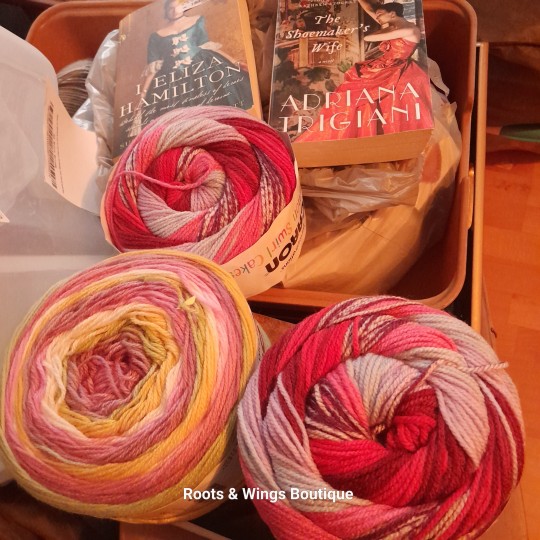
Shop etsycrochetshop maker makerlife etsyseller makers makersgonnamake gift giftforher womensfashion women's apparel accessories handmade crocheter crochetaddict fiberart community reel viral crochetreel create creative nyc nola atl woman ga georgia spring slowfashion modern atlanta shopping buy purchase shopping online usa
#crochetersofinstagram#etsy#craft#crochet#makersgonnamake#handmade#menieresdisease#shop#handmadewithlove#yarn#michaels#crochet crocheting yarn caroncakes caronbigcakes crocheter knitting#caron cakes#bookshelf#book#historical fiction#hamilton
3 notes
·
View notes